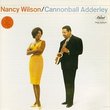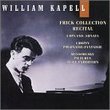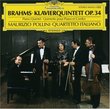| All Artists: Alexander Glazunov, Valery Polyansky, Tadaaki Otaka, Yolando Butt, Ludmila Kuznetsova, Russian State Symphony Orchestra, BBC National Orchestra of Wales, London Symphony Orchestra, Olga Lutsiv-Ternovskaya, Vsevolod Grivnov Title: Glazunov: Symphonies (Complete); Cantatas; Famous Ballet Music; Violin Concerto [Box Set] Members Wishing: 0 Total Copies: 0 Label: Brilliant Classics Original Release Date: 1/1/2008 Re-Release Date: 2/5/2008 Album Type: Box set Genre: Classical Styles: Opera & Classical Vocal, Forms & Genres, Concertos, Instruments, Strings, Symphonies Number of Discs: 7 SwapaCD Credits: 7 UPCs: 842977035650, 5028421935652 |
Search - Alexander Glazunov, Valery Polyansky, Tadaaki Otaka :: Glazunov: Symphonies (Complete); Cantatas; Famous Ballet Music; Violin Concerto [Box Set]
![Glazunov: Symphonies (Complete); Cantatas; Famous Ballet Music; Violin Concerto [Box Set]](https://nationalbookswap.com/cd//l/21/0821/6170821.jpg) | Alexander Glazunov, Valery Polyansky, Tadaaki Otaka Glazunov: Symphonies (Complete); Cantatas; Famous Ballet Music; Violin Concerto [Box Set] Genre: Classical
|
Larger Image |
CD DetailsSimilarly Requested CDs |
CD ReviewsGlazunov's symphonies seductively performed, and at a seduct Dace Gisclard | Houston, TX | 08/23/2008 (5 out of 5 stars) "Lovers of Borodin, Rimsky-Korsakov and early Tchaikovsky should waste no time in snapping up this astonishing bargain box. Glazunov lived to see himself considered an anachronism by enfants terribles like Prokofiev and Stravinsky. Nevertheless, despite the "wisdom" of received opinion, he DID grow as a composer. In the first movement of No.6, one hears harmonic progressions that became characteristic of the young Scriabin. No.8, perhaps his greatest symphony, has a great deal of the kind of pomp and angst one associates with Elgar. Glazunov's symphonies have enjoyed a revival in the last 15 years. Collectors can choose among complete digital sets by Anissimov, Otaka and the present one by Polyansky. As of this date, Serebrier is about halfway through his series, and is getting very positive reviews. Svetlanov's series was briefly available on LP, and from internet scuttlebutt, I gather that Fedoseyev completed his too. This set by Valeri Polyansky and the Russian State Symphony Orchestra is unquestionably the biggest bargain of the lot, but would be among the top picks at ANY price. Even Anissimov's series on NAXOS sells for more, and, although the Moscow Symphony is a first-rate orchestra, the performances are capable but routine. Polyansky's set costs about as much as two of Serebrier's discs put together. Even Otaka's bargain-priced box sells for more, but is shorn of the valuable fillers the discs had in their single CD releases. The amazingly low price of this BRILLIANT set would count for nothing if the performances weren't so terrific. Polyansky's tempi are usually brisker than Anissimov's, although not always. The opening of No.1 is actually slower, adding Brahmsian breadth, yet it feels authentically Russian. (FYI, from an examination of timings, it looks like Serebrier's tempi are only slightly slower or quicker than Polyansky's, with the exception of slow movements, where Serebrier is sometimes MUCH broader.) In Glazunov, Polyansky reveals himself as a master of the carefully built long climax. He never gives too much too soon, controlling himself and the orchestra, knowing when to back off in order to return with renewed intensity again and again. This is NOT to say that he is subdued--these vivid performances alternately caress, entice, generate sparks, and thunder--always at the right moment. His rubato is sensuous and expressive. It does not draw attention to itself--it is not "posed for the camera"--and yet, the listener's sensibilities are ravished without knowing why. Music like this can easily degenerate into mere sound bathing. Polyansky never relaxes his grip on the structure, and points it in the right direction with riveting effect. The Russian State Symphony Orchestra is a superb instrumental body. Gone are the days of Russian orchestras with nasal woodwinds, and saxophone-like horns. CHANDOS' sound is voluptuous--rich yet bright, full yet transparent--even the low bass has definition. There is also just enough hall ambience to surround the orchestra with a tingling shimmer without a hint of opacity. It's the aural equivalent of laying back in tsarist luxuriousness on a cushioned red velvet divan trimmed with gold braid and tassels, yet the effect is never suffocating or heavy. Disappointingly, Polyansky didn't record No.7--that gap is plugged here, oddly, with a performance from the complete set by Otaka and the BBC Symphony of Wales! Luckily, it is excellent, and certainly more lissome than Anissimov. Compared to the RSSO, the strings are leaner, the brass, a little darker, and there is less hall ambiance. Why wasn't Polyansky's series completed? Oh, to have been a fly on the wall during the dealings among BRILLIANT, CHANDOS and BIS! How BRILLIANT gets labels to cooperate like this, I can't imagine, especially in this case, where Otaka's and Polyansky's competing bargain boxes were re-issued almost simultaneously. Let's be grateful to all concerned for this beneficial compromise! Adding to the outrageous attractiveness of Polyansky's set are generous fillers--foremost is an excellent performance of the Violin Concerto. Other items are a suite from the ballet "Raymonda" (with Yondani Butt and the London Symphony Orchestra), two rare cantatas, and various short works. The chorus and the singers are good, although soprano Olga Lutsiv-Ternovskaya sometimes has a little trouble negotiating the upper reaches of the unexpectedly somewhat Italianate coloratura writing on CD#2, track 10, beginning at about 2:45. The only thing that would have made this set even more attractive would have been the inclusion of Yudin's orchestration of the surviving fragment of No.9. The solution is to buy Anissimov's Symphony No.3, which is coupled with this fragment (Glazunov: Symphonies 3 & 9). Even if one intends to wait two or three years and see how Serebrier's series turns out, this excellent set is available NOW, and at this price, there's no reason to hesitate! Go for it! Update of August 28, 2009: Today I noticed that Serebrier has completed his Glazunov series. I haven't heard any of it, so I can't be of help with a comparison. I can say that I wasn't disappointed with Polyansky--in fact, quite the opposite! Nevertheless, Serebrier's series has been garnering raves, so I guess it boils down to price. It's puzzling that the final volume containing Symphonies 1, 2, 3 and the fragment of 9 is described on AMAZON as being on a single CD--surely this is a misprint--it would HAVE to be TWO!" I was surprised................ Paul | Houston | 08/05/2009 (5 out of 5 stars) "Pleasantly surprised to be exact. For the quality of performance and recordings engineered with a dynamite soundstage, this set is a MUST GET. The BRILLIANT CLASSICS label and engineers did a fine job. Did I mention its dirt cheap? Dace was right....read his extensive review." Great sound, great performances K. Braithwaite | inkster, MI USA | 05/24/2010 (5 out of 5 stars) "Top notch recordings of very pleasing underrated music. Late romantic a la Tchaikovsky (first 3 symphonies especially), Kalinnikov, Rimksy-Korsakov."
|

 Track Listings (7) - Disc #1
Track Listings (7) - Disc #1








